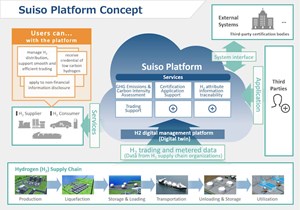News
Kawasaki to start demonstration tests for H2 distribution visualization platform
Kawasaki Heavy Industries announced that it plans to start demonstration tests from April this year for its Suiso (H2 in Japanese) Platform, a digital management system that the company has been developing to enable centralized H2 distribution management and support H2 trading domestically and internationally.
As the practical application of H2 supply and utilization moves forward with the goal of realizing a carbon neutral society, H2 trading is expected to increase on an international scale. However, in regard to actual H2 supply chain operations, H2 distribution is geographically and temporally extensive, including diversification of production sources and international transportation, and the players involved are diverse as well. As a result, the management of information on attributes such as sources of H2 production, distribution routes, emissions of greenhouse gases (GHG) including CO2 in each process of the supply chain becomes highly complex.
Accordingly, a framework enabling digital management and visualization of the entire supply chain—from production to utilization—is essential in order to ensure H2 traceability.
Additionally, in future H2 trading, proving H2 is low-carbon will be highly important. Assessments and certifications of low-carbon H2 ensure transparency and reliability for H2 business operators to engage in low-carbon H2 trading. Moreover, they enable H2 users, including companies that are pursuing non-financial information assessments and disclosure, to confidently make use of H2 as a reliable means to decarbonize their businesses.
Based on consideration of the above, Kawasaki is building a digital platform and planning related services for H2 suppliers, business operators and H2 users with the goal of offering efficient centralized-management of data and information such as sources of H2 production, GHG emissions, and trading. These will ensure traceability for low-carbon H2, visualize complex H2 distribution and facilitate smooth H2 trading.
More specifically, Kawasaki plans to launch the following four services and expand its service offerings in the future in response to market needs.
- Ensured traceability by strengthening chain of custody through the digital management of attribute information such as H2 locations and carbon intensity
- Assessment and management of GHG emissions and carbon intensity
- Support for low-carbon H2 certification application
- Support for H2 trading activities.
Kawasaki has already completed the platform’s basic design. To verify the effectiveness of the services, the company plans to start from April this year demonstration tests for the “Geothermal origin H2 SC Project in Oita” undertaken by Obayashi Corporation. The tests will enable quicker identification of problems with the system as well as functional improvements, thus facilitating efficient development of the system’s detailed design. Kawasaki plans to complete design and development of the platform within 2025 followed by customer assessments and will launch for commercial use around 2028 by a wide range of industry players involved in H2 supply chains.
The services provided through the platform are intended to accelerate the establishment of a full-fledged H2 market environment and promote greater trading of low-carbon H2, while also speeding up the wide-spread deployment of low-carbon H2. In addition to pursuing technological development, demonstration and commercialization, Kawasaki is leading the effort to create a H2-based society using digital technologies as well. Through these efforts, Kawasaki will continue to contribute to the social implementation of H2 and the achievement of carbon neutrality across the world.


